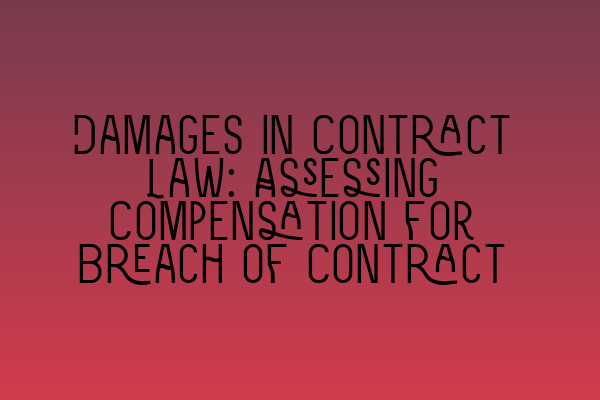Damages in Contract Law: Assessing Compensation for Breach of Contract
Welcome to SQE Contract Law, where we explore the intricacies of contract law to help you navigate the complexities of legal disputes. In this article, we will delve into the topic of damages in contract law and how compensation is assessed in cases of breach of contract.
Understanding Damages in Contract Law
When parties enter into a contract, there is an expectation that both will fulfill their obligations as outlined in the agreement. However, breaches of contract can occur, leading to financial losses for the non-breaching party. Damages, in the context of contract law, are a means of compensation to restore the non-breaching party to the position they would have been in had the contract been performed as agreed.
There are different types of damages that may be awarded, depending on the circumstances and the type of breach. These include:
- Compensatory Damages: These are the most common type of damages and are designed to compensate the non-breaching party for their actual losses. The aim is to put them in the same financial position they would have been in if the contract had been properly performed. Compensatory damages can cover direct losses, such as financial losses or costs incurred, as well as indirect losses, such as damages for loss of business opportunities or reputation.
- Consequential Damages: Also known as indirect or special damages, these are damages that result from the breach but are not directly caused by it. For example, if a supplier fails to deliver goods on time, causing the buyer to lose a valuable business opportunity, the buyer may be entitled to consequential damages.
- Liquidated Damages: These are pre-determined damages specified in the contract itself. They are often used in construction and commercial contracts to provide a fixed amount of compensation in the event of a breach. However, it’s important to note that liquidated damages must be a genuine estimate of the expected loss and not punitive in nature, or else they may be deemed unenforceable by the court.
- Nominal Damages: These are symbolic damages awarded when there has been a technical breach of contract but no actual loss or damage has been suffered. The purpose of nominal damages is to acknowledge the breach and assert that the innocent party’s rights have been violated.
- Punitive Damages: Unlike other types of damages, punitive damages are not typically awarded in contract law. They are used in tort cases to punish the wrongdoer for their conduct. However, exceptions may exist in cases involving fraud, deceit, or willful misconduct.
It’s important to consult with legal professionals when determining the appropriate type of damages to pursue in a breach of contract case.
Assessing Compensation for Breach of Contract
When assessing compensation for breach of contract, the objective is to calculate the actual losses suffered by the non-breaching party. The court aims to place the innocent party in the position they would have been in had the contract been performed as intended.
In order to assess damages accurately, several factors may need to be considered:
- The type and nature of the breach: Different breaches may result in different types and degrees of losses. For example, a minor breach may only result in nominal damages, while a material breach leading to significant financial harm may warrant compensatory damages.
- The foreseeability of the damages: Damages must be foreseeable to be recoverable. This means that the loss must be reasonably foreseeable as a natural consequence of the breach at the time the contract was entered into.
- The extent of the damages: The court will evaluate the scope and extent of the losses suffered by the non-breaching party. This includes direct financial losses, as well as any indirect losses that are a direct result of the breach.
- Mitigation efforts: The non-breaching party has a duty to mitigate their losses by taking reasonable steps to minimize or avoid further harm. Failure to mitigate damages may reduce the compensation awarded.
It’s important to note that the court’s primary goal is to provide compensation for actual losses suffered by the innocent party. They do not aim to punish the breaching party or provide windfall gains to the non-breaching party.
If you find yourself in a breach of contract situation, seeking legal advice can help you understand your rights, assess your losses, and determine the most appropriate course of action.
Conclusion
Damages in contract law are a means of compensation for the innocent party when a breach of contract occurs. There are various types of damages that may be awarded, including compensatory, consequential, liquidated, nominal, and in exceptional cases, punitive damages. Assessing compensation for breach of contract involves considering factors such as the type and nature of the breach, foreseeability of damages, extent of the losses, and mitigation efforts.
For more insights into contract law, we invite you to check out our related articles:
- Interpreting Contractual Clauses: Unlocking the Hidden Meanings
- Contract Law Tutorials: Simplifying Complex Concepts for Students
- Discharge of Contracts: Modes and Consequences Explained
- Exploring Third Party Rights in Contract Law: Implications and Boundaries
- Contractual Obligations: Navigating the Responsibilities of Parties
Remember, when it comes to contract law, understanding your rights and seeking professional legal advice can help you protect your interests and navigate the complexities of legal disputes.
